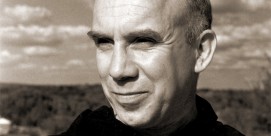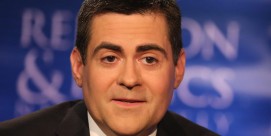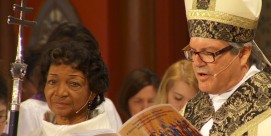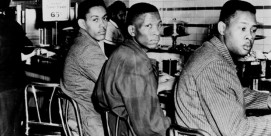In This Episode << SLIDE LEFT TO SEE ADDITIONAL SEGMENTS
Robert Franklin Extended Interview
Read excerpts from Kim Lawton’s interview with Robert Franklin:
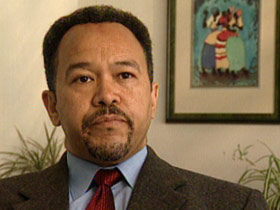
On the essence of Protestantism:
Martin Luther has given an enormous gift to western Christendom. He isolated the notion of faith as a force for change, as a force for revising inherited tradition. That’s at the core of the Protestant spirit — to embrace tradition, to respect and love tradition, but also to be willing to revise and challenge traditions, to adapt them to contemporary circumstances. Protestantism and the spirit of the Protestant ethic, if you will, is precisely to bring tradition into the modern world and be willing to risk letting go of those practices and doctrines that are not liberating.
On why Protestantism flourished in America:
Certainly the emphasis upon individualism — individual commitment to God; individual conscience and accountability for one’s action[s] and behavior; the essential notion that salvation happens person by person, one soul at a time, the individual as she or he stands before God — is the consummate American cultural tradition or ethos of radical individualism, freedom of will, the notion of unlimited boundaries for individuals who have a vision and the energy to act on those visions.
On the interaction between Protestantism and American culture:
Certainly Protestantism had a significant impact upon the shaping of American culture. When you consider the number of U.S. presidents [and] elected officials who were products of Protestant traditions, who articulated America’s story, who exemplified in their own leadership styles the American way of being in the world — so much of that [is] a function of individualism, activism, optimism, unlimited idealism. All of those features that find residue in dominant American culture were very much a part of Protestant doctrine, Protestant ideology that was being nurtured over the decades. While both [American culture and Protestantism] were influencing religion and culture… ultimately Protestantism had a greater impact on shaping the surrounding secular culture.
On what Protestant churches are facing:
There is a sense in which we are living, as many observers have argued, in a postdenominational era. The doctrine and practices that marked various Protestant traditions as distinctive are, in many respects, wearing thin. There is some erosion of denominational loyalty among American contemporary churchgoers. We are becoming a consumer church culture. People search for, in a congregation, an ensemble of ingredients or features that are user-friendly. So being Lutheran or Baptist or Episcopalian may be less important to that church consumer than having a terrific youth program or a great preacher or good music. I find this rampant consumerism is a significant trend that really challenges theologians and church leaders today. How do we reemphasize and retrieve the importance of tradition and loyalty to the tradition, while at the same time not losing our population?
On Protestant denominationalism:
On the whole, I’d say that there have been many negatives. Anytime a religion creates barriers over which people are likely to argue and fight, that is, for the most part, not good. If we can get to the core message of the radical love ethic of Jesus, it enables us, empowers us to set aside some of the more divisive denominational and human-manufactured practices in these religious traditions. I’m certainly one who believes in the spirit of innovation, of moving forward, of leaving behind those elements of tradition that incline people to argue and fight. We’ve just left behind a bloody century in which religious wars and denominational bickering have really distorted the true essence of Christianity, Islam, Judaism, and other great faiths.
On future challenges:
The challenge for the future is to adapt the truths that have been handed down to us to an ever-changing, dynamic reality — increased diversity in our population, certainly in our very pluralistic America; living with technology in a responsible way; trying to negotiate differences across the generations. All of these are going to continue to challenge the best leadership and thinking in our churches.
On other current trends:
One of the trends, and it is going to be an interesting one to follow, is a gender differentiation in religious devotion and religiosity. After the 1960s and ’70s, you began to see more dramatically what I’ve often referred to as a “male exodus” from the churches — men who felt that church was a space where women could have their identities affirmed and needs met. But men sought alternative spaces — fraternities and lodges and sports bars and other places where fellowship and affirmation of identity and collegiality could be experienced. And yet we now see, with Promise Keepers and these mass-movement efforts to attract men back to organized religion, that may be changing. We may be witnessing a reversal of the male exodus. On the other hand, related to this gender dynamics within contemporary American religion, is the phenomenon of women in leadership — women sharing power in religious congregations and communities, and in many traditions the tensions that new phenomenon introduces. A lot of men are not ready to share power. We all know quite a number of churches that do not wish to ordain woman or welcome women in positions of authority and leadership. That’s going to be a continuing fault line in our religious space.
On race and religion:
On one hand, one sees increased nationalism at work in many faith traditions — Latinos and Hispanics who want to preserve Spanish-language services and do not wish to have bilingual services; some African Americans who give even greater emphasis to separation and distinctiveness; heavy emphasis upon reviving [the] black nationalism of earlier years. We certainly see this in many immigrant[s] … who come to this country, who feel less pressure to assimilate [and] become a part of the American mainstream, if you will. On the other hand, you have a very exciting effort to address the historic problem of race, what W.E.B. DuBois called the problem of the 20th century, the color line — churches being honest about a history of racism and their complicity in supporting the race line. To have denominations like Southern Baptists and Methodists apologizing for their support of slavery [and] explicit efforts to reconcile racial and ethnic groups all motivated by the sense of oneness in Christ and devotion to a single God is very important and [a] very hopeful development. We see a tension at work with respect to the racial-ethnic divides — a reemphasis [on] and retrieval of ethnic loyalties, of nationalism and separatism by race supported by religion, and a greater emphasis on overcoming racial difference, of striving for racial reconciliation and finding common ground among various ethnic and racial groups based upon devotion to a single religious faith.
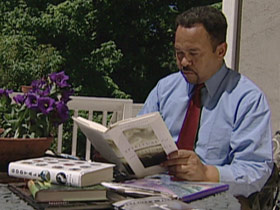
On other significant trends:
How [will] we socialize young people, our children, into these faith traditions? We’re all fretting over the kind of antitraditional spirit we find among Generation X and Y and so on, and over something different and new emerging. There’s the usual adolescent rebellion against organized religion and the traditional pattern in American religious life of young people nurtured in the faith tradition. Once they reach college age or teenage years, there’s this dropping away, an exodus of teens. They tend to return once they get married or on the birth of the first child, and I think that pattern may be changing. Young people who have never had significant organized religious exposure, have no loyalty to a faith tradition, who have been out there on their own, piecing together a philosophy for living from a variety of pop cultural elements as well as bits and pieces of various faith traditions — it’s really quite a new phenomenon. There are a lot of young people today who are searching and cobbling together a homegrown theology that works for them. It’s going to be a real challenge for traditional faith communities to attract those young people into old structures that have fairly rigid boundaries and creeds.
On spirituality outside organized religion:
Individuals who are on their own paths seeking spiritual fulfillment and meaning will tend to vote with their feet and walk past the church, synagogue, or mosque as they continue to find meaning and make meaning for themselves. Many of the traditional religious communities have their standard liturgy and hymnals and ways of doing things, and when people arrive, they expect individuals to find their way into the liturgy, into the established patterns. Today’s spiritual seekers may not be as interested in adapting themselves or conforming to existing or preexisting patterns of worship and experiencing God. Every day they are in the act of searching and making meaning for themselves. If traditional religious denominations and organizations are going to reach these spiritual seekers, [they] are going to have to be far more fluid, open-minded, dynamic, and smarter than in the past in anticipating the challenges they will face, the intellectual resources that are needed to meet smart people who are searching for a meaningful life.
On what African American churches face:
Traditionally, black churches have had a solid hold upon two tensions within American religious life: a commitment to social transformation, the Social Gospel changing social structures, working for justice; and individual salvation, personal spiritual fulfillment, and relating individuals to the holy. Black churches have done a pretty good job of holding those together, but now, in the post-civil rights movement period, regrettably the two don’t often meet, and there’s been a loss of the wholeness that marked the religion of Martin Luther King and the theologian Howard Thurman. I think we’re going to continue to see that trend, that drift, that polarity. There’s also a lot of concern about the future of black worship. The traditional preaching, prayer, and song traditions are also eroding and giving way to gospel, rap — more pop culture finding its way into the black church faith, especially churches led by younger seminary-trained pastors. Many of us worry that we’re going to lose some of the poetic, lyrical, rhetorical genius that we’ve found in traditional black preaching as contemporary ministers adapt a more didactic teaching style — walking about with the open Bible and teaching line by line. That’s important, it’s valuable, but I’d hate to lose the tremendous gift of black preaching that the black church has given to all of America.
On culture as a threat to religious faith:
We all fret over the impact of materialism, the emphasis [on] and preoccupation with more things in our lives. The world of science and technology is phenomenal; it delivers new toys to us and new opportunities for distraction from the life of the spirit, the life of the mind. Another is the phenomenon of pleasure seeking, the avoidance of pain, suffering, conflict, and the desire for feel-good religious experience that matches the feel-good promises of the culture. And yet, there are messages in all of the great religious faiths that remind us that suffering is part of the human experience and has to be grappled with — that death and mortality are realities, and part of the burden of theology and of faith is to help one make sense of one’s brief life in the face of finitude, mortality, suffering, and tragedy. Today’s popular culture and too much of today’s superficial religion simply seek to avoid that entire dimension of the human experience.
On the dichotomy between religion and culture:
People try to give [the] right answer when they are asked a question by survey interviewers. But as you really observe how people live their lives, how they spend their time, how they spend their money, you find a very different set of responses. Religion is easier professed than lived. I love G. K. Chesterton’s wonderful quote that the Christian faith hasn’t been tried and found wanting; it’s been found difficult and left untried. For the most part, people simply leave untried the challenging ethical imperatives of mature religious faith. That’s about self-sacrifice. It’s about service. It’s about sharing prosperity, and it’s about fighting for justice on behalf of those who have no voice. Ultimately, it’s about speaking truth to power. In the culture, an alternative religious system supplants the historic faiths that we’ve come to cherish. And that’s a religion of politeness, of pleasure seeking, a superficial, make-it-through-the-day survivalism that is not particularly rich or satisfying. The great religions have to find their new voices. Yale historian Jaroslav Pelikan says that tradition is the living faith of the dead, but traditionalism is the dead faith of the living. All that we cherish in the great moral exemplars — Jesus, Buddha, Mohammed, Moses — that has enriched our lives and culture and transformed the world for good is certainly something we want to embrace and continue to learn from. But not all of those traditions liberate. It is finding the liberating vision and the liberating voice within those traditions in contemporary circumstances that is the burden of theology. The pressure is on contemporary religious leaders to listen to the culture, listen to young people, listen to people who are suffering, and listen to the great voices of the past and find harmony, find congruence that enables us to adapt the lessons of yesterday to today and tomorrow’s reality.


